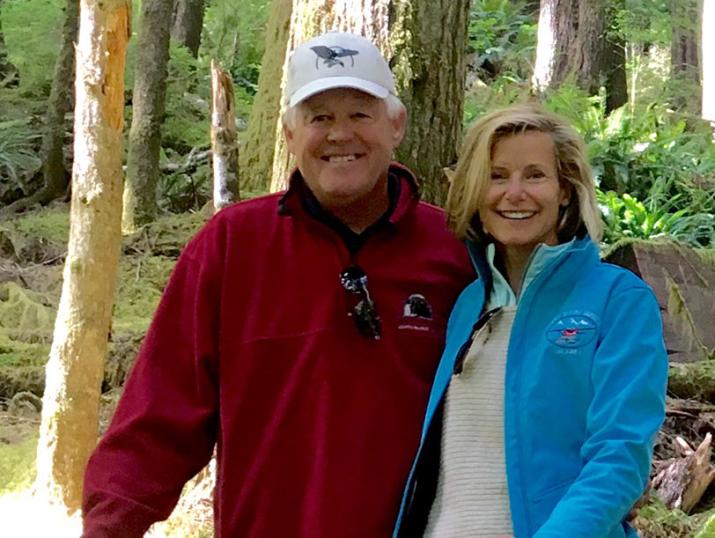
DGHI board chair Jack Leslie, and his wife, Caroline Pech, established the Leslie Family Global Health Fellowship Fund.
Published March 14, 2017
We’re pleased to share the eighth in a series of profiles that highlight qualifying gifts for the Bill & Melinda Gates Foundation Global Health Matching Grant. This dollar-for-dollar match is reserved for gifts that support priority areas for the Duke Global Health Institute: education programs, graduate fellowships, faculty support and international partnerships. Unrestrictive gifts for use at the discretion of the Institute director may also be given.
We recently talked with Jack Leslie, chair of the Duke Global Health Institute (DGHI) board of advisors and chairman of Weber Shandwick, a global communications and engagement firm, to learn more about why he and his wife, Caroline Pech, established the Leslie Family Global Health Fellowship Fund.
This fund will provide whole or partial fellowships to graduate, professional or doctoral students enrolled in DGHI graduate programs, with a preference for students from Africa studying global health and/or students pursuing research pertaining to the strengthening of health systems in Africa.
DGHI: What inspired your interest in global health?
Jack Leslie: I started my career working as an aide for Senator Edward Kennedy, who chaired the Senate Health Subcommittee for many years and had such a strong interest in health-related issues. My own interest in health was attuned by that experience. After that, when I started traveling to different countries throughout the world as a political consultant, I quickly realized that a healthy democracy depends on a healthy population—that you can’t really grow as an economy and as a nation without healthy people.
Those experiences—and that realization—have inspired me to become involved in a number of different global health-related causes over the years. (Editor’s Note: See some of Leslie’s global health roles here.)
DGHI: Your fund is directed toward African students and students who are focused on strengthening health systems in Africa. What draws you to Africa and this particular issue?
Leslie: I started to become more interested in Africa about 10 or 15 years ago, when President Bush appointed me to the board of directors of the United States African Development Foundation (USADF), a little-known but very effective independent agency of the federal government. In my capacity with USADF—initially as board member and later as board chair, appointed by President Obama—I had the opportunity to visit a number of different countries in Africa. These experiences reinforced what I’d learned many years ago in my work as a political consultant: health is a fundamental factor to development.
I also realized that to create more sustainable health solutions in Africa, we have to build and strengthen health systems, and these systems must be African-led and African-managed. To do this, we need to help develop African talent, so our fund is specifically directed toward African students who are interested in health systems, as opposed to a clinical area of health.
DGHI: What motivated you to make this gift?
Leslie: Since I’ve been on the board of the institute, I’ve seen the incredible progress that we’ve made and the need for financial support to keep it going. Also, a few years ago, my wife and I had an opportunity to go to Moshi, Tanzania, to observe and learn about DGHI’s work with our partners at the Kilimanjaro Christian Medical Centre and Kilimanjaro Christian Medical University College (KCMUC). That was an amazing experience and an eye-opener for both of us.
For example, KCUMC has more than 1,000 medical students, with access to a state-of-the-art computer lab and curriculum delivery software donated by the Duke School of Medicine—just a couple of the outcomes of the Medical Education Partnership Initiative between Duke and several Tanzanian medical and academic institutions. When we saw the impact Duke can have in the field, it really inspired us to do what we could to support this work.
DGHI: How do you hope your gift will advance our mission of preparing the next generation of global health leaders?
Leslie: Our gift is quite literally geared toward preparing the next generation of health leaders in Africa—training leaders in-country who are going to be needed to manage their own health care systems.
DGHI: Describe your vision for the Institute in the next five to 10 years.
Leslie: The institute has been very successful in developing its academic and field programs. In the next five to 10 years, we’ll continue building on the strong foundation that [DGHI director] Mike Merson and others have created.
In particular, we’ll need to focus on meeting the increasing demand for global health education, particularly among undergraduates. In fact, we’ve seen that Duke’s global health programs can play an integral role in attracting students to the university.
To learn more about the matching grant and read other donor stories, visit the matching grant page of our website.


